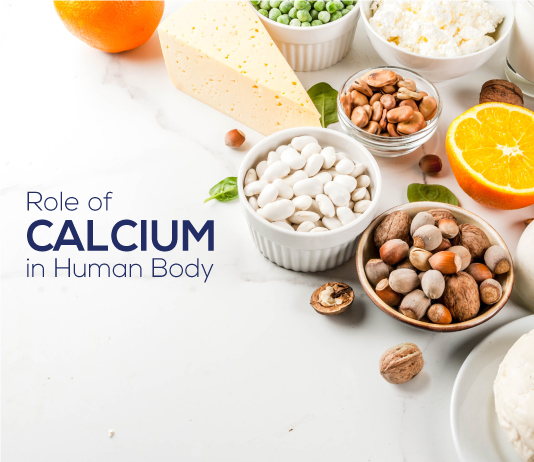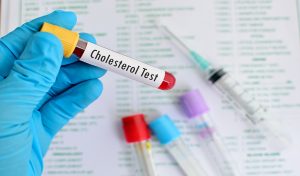Calcium is one of the most vital minerals required by the human body. Our body combines Calcium with other minerals to form hard crystals that give our bones strength and structure. Almost 99% of our body’s Calcium is found in the bones.
Calcium is also required for muscle function, nerve transmission, intracellular signaling, and hormonal secretion [1]. Long term deficiency of Calcium is called Hypocalcemia and can lead to Osteoporosis, weak bones, and dental problems.
Functions of Calcium
1. Calcium makes bone strong
Calcium is instrumental in the formation and metabolism of bone. Calcium is found in the form of Calcium hydroxyapatite in bones and teeth that provides hardness to the bone and teeth. Bones also serve as a reservoir and source of Calcium for other Calcium-dependent functions throughout the body.
2. Regulates muscle contraction
Calcium stimulates numerous Calcium-dependent signaling pathways that regulate muscle contraction in skeletal and cardiac muscle. It triggers muscle contraction by reacting with muscle fiber actin and myosin. In the presence of Calcium, actin and myosin come closer resulting in muscle contraction. In the absence of Calcium, actin and myosin do not interact thereby resulting in relaxation of the muscle[2], [3].
3. Calcium is involved in neuronal signaling
Calcium is essential to neurons as it participates in the transmission of the neuronal signals by triggering the release of neurotransmitters stored in the nerve cell. Neurotransmitters are the chemical messenger that transmits signals from one neuron to another [4], [5].
4. Calcium prevents excessive blood loss
Calcium along with Vitamin K helps in the clotting of blood and preventing the excessive flow of blood. Calcium is an integral part of cascade reactions involved in blood clotting [6].
5. Calcium protects us from skin conditions
Calcium ions (Ca2+) in the epidermis are essential in regulating keratinocyte differentiation and skin barrier formation [7]. Impaired keratinocytes(cells of the epidermis) differentiation and dysfunctional skin barrier can be the primary causes of inflammatory skin conditions.
Symptoms of Calcium Deficiency
With Calcium playing a pivotal role across the body, it is important to pay attention to the signs that our body is giving.
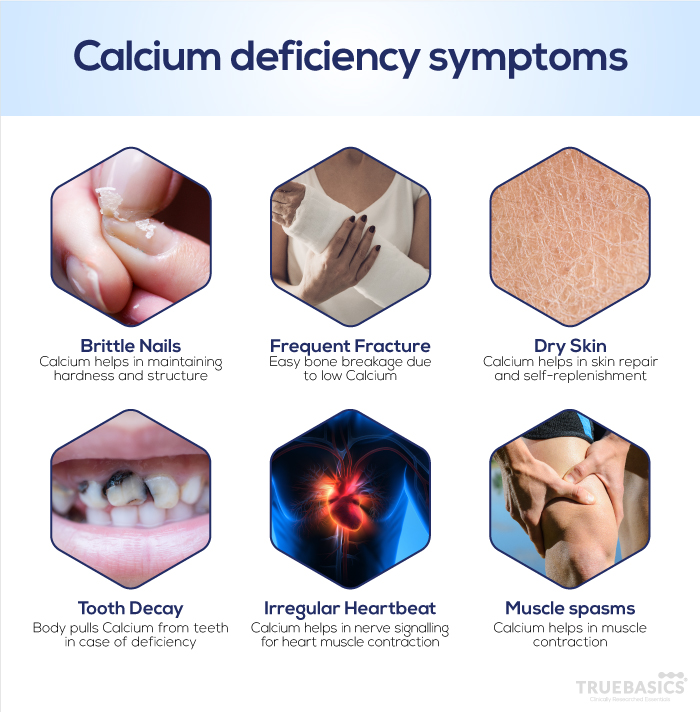
Check for these 10 signs to know if your Calcium levels are below the required amount:
1. Brittle Nails
Chronic low levels of Calcium often result in brittle nails. Nails are made up of hardened keratin and include a significant level of Calcium deposit as well. Calcium plays a key role in maintaining the hardness and structure of nails and keeps the tissues of the nail bed healthy. Lack of Calcium in the body can lead to dry and brittle nails that split, break, peel off easily.
2. Frequent Fracture & Easy Bone Breakage
Since almost 99% of our body’s Calcium is in our bones, it is not surprising that a Calcium deficiency would impact our bone health as well. Low levels of Calcium in the body can cause our bones to weaken leaving them prone to easy fractures and breaking.
3. Dry skin & Eczema
Calcium is also found on the outer layers of skin (epidermis) where it plays an important role in skin repair and self-replenishing. Studies have also linked Calcium presence to skin aging [8]. Low levels of Calcium in the body can result in dry and itchy skin.
Eczema is another skin disorder that can develop due to a chronic deficiency of Calcium. Eczema is the general term for skin rashes and inflammations. The symptom includes itchiness, redness, and blisters on the skin. Eczema is treatable with topical ointments and medication but its best to correct your Calcium intake as well.
4. Coarse Hair
Calcium plays a key role in keeping the hair healthy as well. Calcium helps with the secretion of hormones and certain nutrients, such as biotin, that help with hair growth. Deficiency of Calcium can lead to the hair becoming brittle, coarse and weak. A rapid hair loss could be one of the signs of Calcium deficiency in the body.
5. Irregular Heartbeat
The heart is the most important muscle in the human body and is dependent on Calcium to help with its regular contractions. Calcium is needed to send signals through the nerves to the heart muscle for pumping blood throughout the body.
6. Muscle Spasms or Cramps
Muscle spasms and cramps are one of the most common symptoms of Calcium deficiency and also one of the firsts to appear. Calcium plays an important role in muscular contractions. Low Calcium levels can disrupt the normal muscle contractions resulting in pain, spasms, and cramps even while doing light physical activity.
7. Blood Clotting
Calcium plays an important part in the blood clotting process. Along with Vitamin K and fibrinogen, Calcium works to help the body form clots during wounds and injuries
8. Tooth Decay
After bones, teeth hold the most Calcium of the body and therefore it’s not surprising that Calcium deficiency shows up in teeth as well. When our body experiences chronic Calcium deficiency, it starts to pull Calcium from the teeth as well. This can result in dental problems, brittle gums, and tooth decay.
9. High Blood Pressure
A plethora of studies has been conducted establishing the inverse relation of Calcium with blood pressure. Low Calcium levels have been shown to increase blood pressure while adequate Calcium supplementation has been shown to bring down systolic blood pressure [9]. However, the range of increase/decrease in blood pressure is still being researched upon.
10. Depression
Among other factors, depression and other mood disorders stem from dysfunction in the central nervous system as well. Some studies have shown a Calcium deficiency can lead to the development of depression symptoms as well [10]. Calcium helps in transmitting messages in nerves and therefore plays a key role in releasing hormones and assists muscle functioning. Symptoms of dysfunction of the nervous system due to low levels of Calcium can manifest in the form of depression, irritability, and other mood related disorders.
How to Combat Calcium Deficiency
Indian Council of Medical Research (ICMR) and National Institute of Nutrition (NIN) recommend a daily intake of 600 mg Calcium per day for adult men and women while it goes up to 1,200 mg Calcium per day for pregnant women.
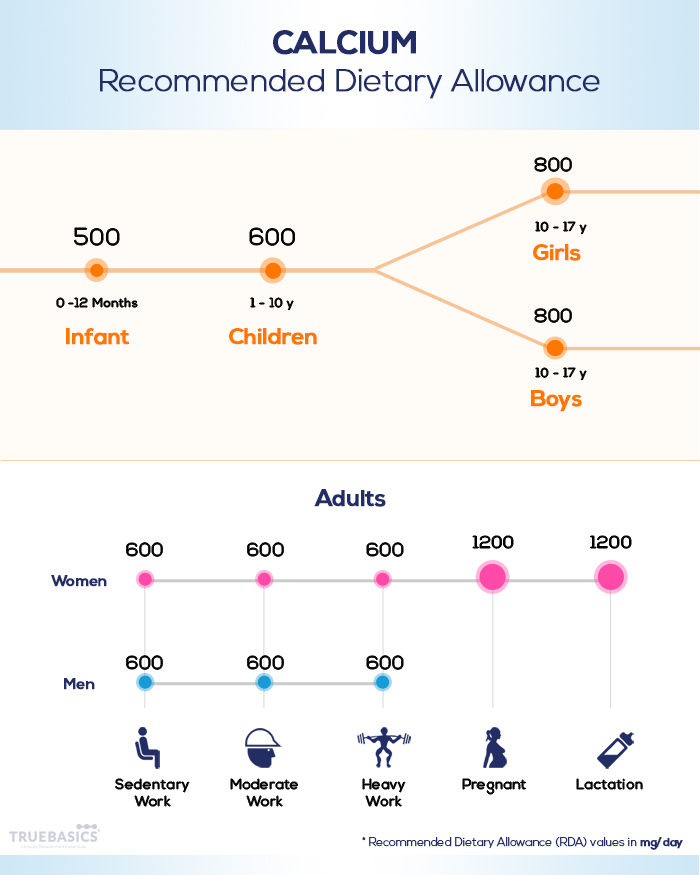
Include these 10 Calcium rich food in your diet to fulfil your daily Calcium requirement –
- Almonds
Almonds are a good source of Calcium, Vitamin E, Omega-6 fatty acids, fiber, and protein. Almonds contain 264 mg Calcium per 100 g serving - Sesame Seeds
Sesame seeds contain 975 mg of Calcium per 100 g serving. - Oranges
Citrus fruits are a good source of Vitamin C as well as Calcium. Oranges contain 40 mg Calcium per 100 g size. - Raw Spinach
Known for being a rich source of Iron, 100 g spinach contains 99 mg Calcium. - Yogurt
A 100 g serving of this dairy product contains as much as 121 mg Calcium. - Broccoli
Broccoli is a good source of Vitamin A, C and key minerals like Calcium, magnesium and phosphorous. 100 g portion of broccoli provides 47 mg of Calcium. - Milk
Milk is the all-time favorite source of Calcium. 100 g of Milk provides 169 mg Calcium along with Vitamin A, phosphorous and potassium. - Quinoa
Quinoa is a good source of key minerals like Calcium, magnesium, phosphorous and potassium. 100g of Quinoa provides 47 mg Calcium. - Chia Seeds
Chia seeds are an excellent source of Calcium as well as another essential nutrient like Omega-3 Fatty Acids. 100 g chia seed contains 631 mg of Calcium. - Swiss Cheese
One slice of cheese is enough to provide 221 mg of Calcium to the body. 100 g of it contains 791 mg Calcium.
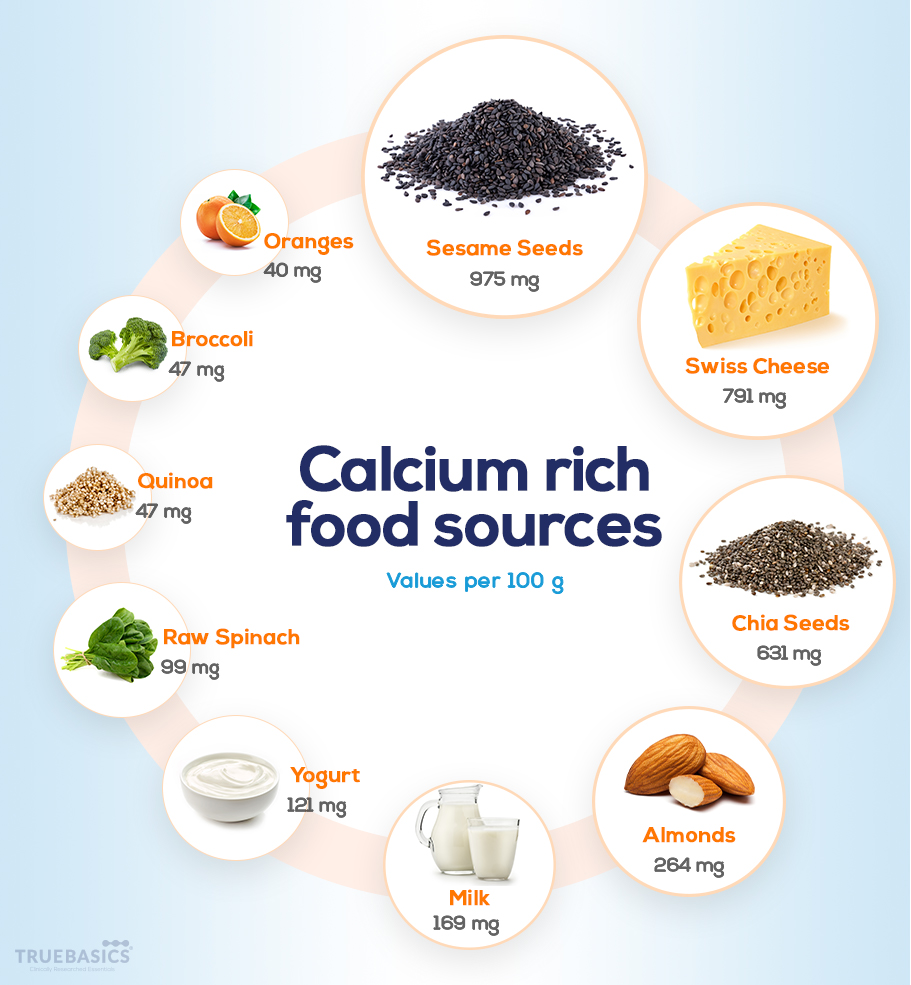
With today’s fast paced life, it becomes difficult for even the healthiest of us to maintain a wholesome diet. Supplementing Calcium with dietary supplements can be a healthy alternative.
In Conclusion…
Calcium is a vital mineral that plays a key role in bone formation and functioning of the heart, muscles, and nerves. Calcium deficiency takes time to manifest in visible signs and therefore it is important to try to get enough Calcium every day. Let’s pledge to include Calcium rich foods and supplements in our diet and march towards a deficiency free India.
#ShareIfYouCare #RepublicofDeficiency
Sources:
[1] https://www.ncbi.nlm.nih.gov/books/NBK56060/
[2] https://www.ncbi.nlm.nih.gov/pmc/articles/PMC1334730/
[3] https://www.ncbi.nlm.nih.gov/pmc/articles/PMC4315934/
[4] https://www.ncbi.nlm.nih.gov/pmc/articles/PMC3249630/
[5] https://www.ncbi.nlm.nih.gov/pubmed/24442513
[6] https://www.ncbi.nlm.nih.gov/pmc/articles/PMC4260295/
[7] https://www.ncbi.nlm.nih.gov/pmc/articles/PMC5929942/
[8] https://www.ncbi.nlm.nih.gov/pubmed/25262846
[9] https://www.ncbi.nlm.nih.gov/pmc/articles/PMC3506873/
[10] https://www.ncbi.nlm.nih.gov/pmc/articles/PMC3542443/

